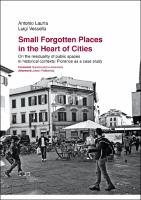Small Forgotten Places in the Hearth of Cities
On the residuality of public spaces in historical contexts: Florence as a case study
Author(s)
Laurìa, Antonio
VESSELLA, LUIGI
Language
EnglishAbstract
This book is the result of a research project designed and carried out at the Department of Architecture, University of Florence. This book discusses urban public spaces and, more specifically, run-down, inactive micro-spaces that are barely used due to their location, dimensions, morphology or semantic characteristics. In literature, these spaces are often defined as “residual urban spaces.” A large abandoned industrial area on the outskirts of a town or a small interstitial space in a historical centre can be residual. With respect to such a broad subject matter, the book seeks to radically limit the field, concentrating on public residual spaces found in the oldest parts of cities. The book reflects on this theme and introduces a method for reading and assessment of the residuality of public spaces in historical contexts (Residuality Assessment Process) which was tested in the historical centre of Florence. It is the authors’ view that residual spaces, above all if designed according to a system logic, can go from being problems to potential activators of urban and social regeneration processes, offering a useful contribution to improve city life.
Keywords
urban public spaces; run-down; inactive micro-spaces; residual urban spaces; regeneration processesDOI
10.36253/978-88-5518-497-7ISBN
9788855184977, 9788855184960, 9788855184984, 9788855184991, 9788855184977Publisher
Firenze University PressPublisher website
https://www.fupress.com/Publication date and place
Florence, 2021Series
People_Places_Architecture, 1Pages
156Metrics
Measures
Timeline
Geographical
Information


 Download
Download Web Shop
Web Shop